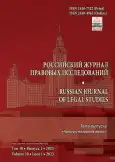Problems and Prospects of Advanced Legal Regulation in the Context of Digitalization Processes
- Authors: Ukhanov A.D.1
-
Affiliations:
- Vladivostok State University
- Issue: Vol 10, No 1 (2023)
- Pages: 45-54
- Section: Theoretical and historical legal sciences
- Submitted: 13.01.2023
- Accepted: 01.03.2023
- Published: 18.04.2023
- URL: https://journals.eco-vector.com/2410-7522/article/view/121825
- DOI: https://doi.org/10.17816/RJLS121825
- ID: 121825
Cite item
Abstract
The processes of introducing digital technology into all spheres of human activity actualize the idea of advanced lawmaking, which is currently associated with the possibility of minimizing the risks of digitalization and preventing its threats. At the same time, while not completely new, this idea poses a number of independent problems, each of which should be taken into account when developing doctrinal and legal (strategic) acts aimed to advance the settlement of digitalization processes. The problems include, first, philosophical and ideological validity, second, the lack of proven theoretical and methodological tools for legal forecasting (modeling), third, the substantive uncertainty of legal acts that include advanced legal norms, and fourth, the formal legal difficulties of embedding these cars in the existing system of legislation and the presentation of their contents. Being fair for advanced lawmaking as such, these problems can be considered separately and in detail in the context of digitalization processes.
Full Text
About the authors
Anton D. Ukhanov
Vladivostok State University
Author for correspondence.
Email: vin-chun.95@list.ru
ORCID iD: 0000-0003-0113-5057
SPIN-code: 6730-2646
Assistant
Russian Federation, VladivostokReferences
- Gaivoronskaya YaV, Miroshnichenko OI, Mamichev AYu. Indiscreet charm of digitalization. Legal Concept. 2019;4:40–47. (In Russ.). doi: 10.15688/lc.jvolsu.2019.4.5
- Shvab K. Chetvertaya promishlennaya revolyuciya. Moscow: Eksmo, 2022. 208 p. (In Russ.).
- Bespalova TV. «Sub"ektnost'» robotov versus sub"ektnost' cheloveka: eticheskie predely. In: Mamichev A.Yu., Mordovcev A.Yu., Petruk G.V., editors. Roboti zayavlyayut o svoih pravah doktrinalno pravovie osnovi i nravstvenno eticheskie standarti primeneniya avtonomnih robotizirovannih tehnologii i apparatov kollektivnaya monografiya. Moscow, 2020. P. 71–73. (In Russ.).
- Plujnikov NN. Cifrovizaciya obrazovaniya v period pandemii socialnie vizovi i ugrozi. Logos et Praxis. 2021;1:15–22. (In Russ.). doi: 10.15688/lp.jvolsu.2021.1.2
- Halin VG, Chernova GV. Digitalization and its impact on the russian economy and society: advantages, challenges, threats and risks. Upravlencheskoe konsultirovanie. 2018;10:46–36 (In Russ.). doi: 10.22394/1726-1139-2018-10-46-63
- Gaivoronskaya YaN. Digitalization risks and threats. Advances in Law Studies. 2020;S5:25–32. (In Russ.). doi: 10.29039/2409-5087-2020-8-5-25-32
- Mamichev AYu. “Digital leviathan”: scenarios for the development of the hobbesian monster in the 21st century. Vestnik Rossiiskogo universiteta drujbi narodov. Seriya Politologiya. 2022;3:367–392. (In Russ.). doi: 10.22363/2313-1438-2022-24-3-367-392
- Baranov PP, Mamychev AY, Kim AA, et al. Digital transformation of law and socio-political relations in the Eurasian space — on the example of the Russian Federation. Journal of Political and Law. 2019;4:87–92.
- Talapina EV. Law and digitalization: new challenges and prospects. Jurnal rossiiskogo prava. 2018; 2:5–17 (In Russ.). doi: 10.12737/art_2018_2_1
- Mamichev AYu, Miroshnichenko OI. Modeling the future of law: problems and contradictions of legal policy in the sphere of normative regulation of artificial intelligence and robotic technologies. Pravovaya politika i pravovaya jizn. 2019;2:125–133. (In Russ.).
- Habrieva TYa. The Law In The Conditions Of Digital Reality. Jurnal rossiiskogo prava. 2019;1:85–102. (In Russ.). doi: 10.12737/ART_2018_1_7
- Savini FK fon. Sistema sovremennogo rimskogo prava. Ed. by O. Kutateladze, V. Zubar. Moscow, 2001. 513 р. (In Russ.).
- Mordovcev AYu. Social'naya priroda prava i robototekhnika: osobennosti predmeta pravovogo regulirovaniya. In: A.Yu. Mamichev, A.Yu. Mordovcev, G.V. Petruk, editors. Roboti zayavlyayut o svoih pravah doktrinalno pravovie osnovi i nravstvenno eticheskie standarti primeneniya avtonomnih robotizirovannih tehnologii i apparatov kollektivnaya monografiya. Moscow, 2020. P. 11–14. (In Russ.).
- Malcev GV. Problema chastnogo i publichnogo prava. Sociologiya vlasti. 2003;3:20–46. (In Russ.).
- Baranova MV. Operejayuschee pravotvorchestvo kak strategicheskii resurs i takticheskoe sredstvo gosudarstvennogo upravleniya v sovremennoi Rossii. Yuridicheskaya tehnika. 2015;9:120–125. (In Russ.).
- Agamirov KV. Yuridicheskoe prognozirovanie kak faktor sovershenstvovaniya rossiiskoi pravovoi sistemi. Moscow: Prospekt; 2021. 528 p. (In Russ.).
- Akopyan OA, Vlasova NV, Gracheva SA. Pravovie modeli i realnost. Moscow: INFRA-M; 2014. 280 p. (In Russ.).
- Schmitt C. Ponyatie politicheskogo. Ed. by A.F. Fillipov. Saint-Perersburg, 2016. P. 293–356. (In Russ.).
- Kelsen H. Pure Theory of Law. 2nd editon. Transl. from German by M. Antonov and S. Loesov. Saint Petersburg: Alef Press Publishing House, 2014. P. 109–230. (In Russ.).
- Tulikov AV. Foreign legal doctrine in the it era. Pravo. Jurnal Visshei shkoli ekonomiki. 2016;3:235–243. (In Russ.). doi: 10.17323/2072-8166.2016.3.235.243
- Malcev GV. Socialnie osnovaniya prava. Moscow: INFRA-M; 2011. 800. (In Russ.).
- Mushinskii MA. Strategii koncepcii doktrini v pravovoi sisteme Rossiiskoi Federacii problemi statusa yuridicheskoi tehniki i sootnosheniya drug s drugom. Yuridicheskaya tehnika. 2015;9:488–499. (In Russ.).
Supplementary files








